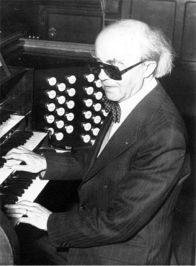Related Research Articles

Giovanni Pierluigi da Palestrina was an Italian composer of late Renaissance music. The central representative of the Roman School, with Orlande de Lassus and Tomás Luis de Victoria, Palestrina is considered the leading composer of late 16th-century Europe.

Charles Arnould Tournemire was a French composer and organist, notable partly for his improvisations, which were often rooted in the music of Gregorian chant. His compositions include eight symphonies, four operas, twelve chamber works and eighteen piano solos. He is mainly remembered for his organ music, the best known being a set of pieces called L'Orgue mystique.

César-Auguste-Jean-Guillaume-Hubert Franck was a French Romantic composer, pianist, organist, and music teacher born in present-day Belgium.

Amédée-Ernest Chausson was a French Romantic composer.

Jean François-Hyacinthe Langlais III was a French composer of modern classical music, organist, and improviser. He described himself as "Breton, de foi Catholique".

The American Enlightenment was a period of intellectual and philosophical fervor in the thirteen American colonies in the 18th to 19th century, which led to the American Revolution and the creation of the United States. The American Enlightenment was influenced by the 17th- and 18th-century Age of Enlightenment in Europe and native American philosophy. According to James MacGregor Burns, the spirit of the American Enlightenment was to give Enlightenment ideals a practical, useful form in the life of the nation and its people.
David Charles Stove was an Australian philosopher whose writings often challenged prevailing academic orthodoxy. He was known for his critiques of postmodernism, feminism, and multiculturalism.

The Société nationale de musique was an organisation in late 19th and early 20th century Paris, promoting French music and allowing rising composers to present their works in public. It was founded in the aftermath of France's defeat in the Franco-Prussian War of 1870–71 on a strong tide of nationalist feeling, and at first excluded all music by non-French composers. In its first 30 years it gave the premieres of works by composers including Saint-Saëns, Chabrier, Franck, Fauré, Dukas and Debussy.

The Symphony in D minor is the best-known orchestral work and the only mature symphony written by the 19th-century composer César Franck. It employs a cyclic form, with important themes recurring in all three movements.

Les XX was a group of twenty Belgian painters, designers and sculptors, formed in 1883 by the Brussels lawyer, publisher, and entrepreneur Octave Maus. For ten years, they held an annual exhibition of their art; each year 20 other international artists were also invited to participate in their exhibition. Painters invited include Camille Pissarro, Claude Monet, Georges Seurat, Paul Gauguin, Paul Cézanne (1890), and Vincent van Gogh.

The Basilica of Saint Clotilde is a basilica church located on the Rue Las Cases, in the 7th arrondissement of Paris. It was constructed between 1846 and 1856, and is the first example of a church in Paris in the neo-Gothic style.
James Franklin is an Australian philosopher, mathematician and historian of ideas.

William Peter Coleman was an Australian writer and politician. A widely published journalist for over 60 years, he was editor of The Bulletin (1964–1967) and of Quadrant for 20 years, and published 16 books on political, biographical and cultural subjects. While still working as an editor and journalist he had a short but distinguished political career as a Member of the New South Wales Legislative Assembly from 1968–1978 for the Liberal Party, serving both as a Minister in the State Cabinet and in the final year as Leader of the New South Wales Opposition. From 1981–1987 he was the member for Wentworth in the Australian House of Representatives.
Quakers Hill Press is a small press Australian publishing company. It was founded in 1990 by Peter Day, a former US correspondent for The Australian.

The Police Department of the MVD was the main police force of the Russian Empire and part of the Ministry of Police in the late 19th century, and was responsible for the management of all the police forces in the Russian Empire including Okhrana branches, and was aided by the Special Corps of Gendarmes.
This bibliography of James Madison is a list of published works about James Madison, the 4th president of the United States.
Les Éolides,, FWV 43, CFF 127, is a symphonic poem by French composer César Franck written in 1876 and premiered the next year. Its approximate duration is 11 minutes.
Joël-Marie Fauquet is a French musicologist.

Psalm 150 is a psalm setting by César Franck. He wrote the composition, setting Psalm 150 for four-part choir, orchestra and organ, in 1883. It was published in 1896 by Breitkopf & Härtel. Carus-Verlag published an arrangement for choir, strings and organ. The incipit in French is Halleluiah! Louez le Dieu, caché dans ses saints tabernacles.

Bibliography of early American publishers and printers is a selection of books, journals and other publications devoted to these topics covering their careers and other activities before, during and after the American Revolution. Various works that are not primarily devoted to those topics, but whose content devotes itself to them in significant measure, are sometimes included here also. Works about Benjamin Franklin, a famous printer and publisher, among other things, are too numerous to list in this bibliography, can be found at Bibliography of Benjamin Franklin, and are generally not included here unless they are intensely devoted to Franklin's printing career. Single accounts of printers and publishers that occur in encyclopedia articles are not included here.
References
- ↑ "inauthor: "R. J. Stove"". Google books . Retrieved 14 February 2010.
- ↑ Stove, David Charles (1995). Cricket versus Republicanism: and other essays By David Charles Stove. Quakers Hill Press. ISBN 9780646213286 . Retrieved 14 February 2010.
- ↑ "Triptych [music] : for organ / by R. J. Stove". catalogue. National Library of Australia. 2006. Retrieved 14 February 2010.
- ↑ "Atheist Convert: R.J. Stove". Originally published in The Traditionalist, 2011. Retrieved 14 April 2012.